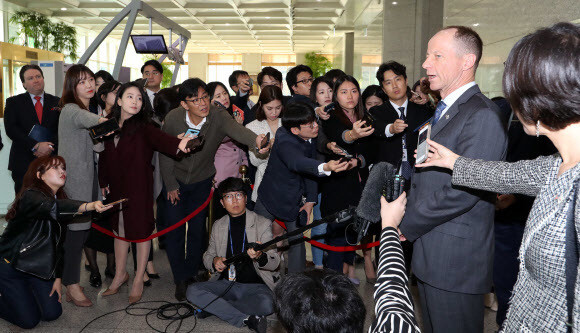hankyoreh
Links to other country sites 다른 나라 사이트 링크
S. Korea reportedly considering putting off GSOMIA termination date

As the scheduled termination date for its intelligence-sharing agreement with Japan approaches, South Korean is reportedly considering postponing the termination until a time when the two countries can reach a resolution to their current dispute on trade and historical issues.
On Aug. 23, Seoul sent an official message to Tokyo announcing its decision to pull out of the General Security of Military Information Agreement (GSOMIA), and the pact is supposed to officially wrap up 90 days later, at 12:01 am on Nov. 23. The US has been pressuring Seoul to reconsider its decision, which it says undermines trilateral security cooperation between South Korea, the US, and Japan.
But Seoul is stressing the position that its decision cannot be changed without the withdrawal of unfair export control measures imposed by Japan on the grounds that South Korea “cannot be trusted in security terms.” Tokyo is insisting that Seoul present a solution on a South Korean Supreme Court ruling ordering compensation for forced labor conscription. With the two sides so bitterly at odds, the likelihood of them reaching an agreement in the two weeks before GSOMIA ends appears slim.
Under the circumstances, the US has reportedly proposed an alternative approach of temporarily postponing the GSOMIA end date and keeping the agreement in place until a solution can be found, while working busily behind the scenes to coordinate between the South Korean and Japanese sides. Such is the importance the US places on maintaining GSOMIA, an intelligence exchange framework for trilateral military cooperation as part of its Indo-Pacific strategy and policies to rein in China. Its apparent conclusion is that once the current agreement ends, another one would be very difficult to establish in view of the complex mix of historical, economic, and security-related issues in South Korea-Japan relations.
According to the Blue House, David Stilwell, the US assistant secretary of state for East Asian and Pacific affairs, met with Blue House National Security Office Second Deputy Chief Kim Hyun-chong for around 70 minutes on the morning of Nov. 6 during the former’s South Korea visit, and that the two held concrete discussions on GSOMIA. The postponement appears to have been one of various ideas discussed. A diplomatic source said on Nov. 7 that “while [South Korea] has announced the end of the agreement, theoretically it could be extended again or its termination could be put off if the two sides reach an agreement.”
“All South Korea and Japan would have to do is come up with an agreement saying the termination date has been postponed,” the source explained.
But while the US appears to be willing to revert to in-person meetings and direct pressure to stop GSOMIA from ending, South Korea has no rationale for reversing its GSOMIA termination decision without a change in Japan’s export control measures.
By Park Min-hee, staff reporter
Please direct comments or questions to [english@hani.co.kr]

Editorial・opinion
![[Column] Park Geun-hye déjà vu in Yoon Suk-yeol [Column] Park Geun-hye déjà vu in Yoon Suk-yeol](https://flexible.img.hani.co.kr/flexible/normal/500/300/imgdb/original/2024/0424/651713945113788.jpg) [Column] Park Geun-hye déjà vu in Yoon Suk-yeol
[Column] Park Geun-hye déjà vu in Yoon Suk-yeol![[Editorial] New weight of N. Korea’s nuclear threats makes dialogue all the more urgent [Editorial] New weight of N. Korea’s nuclear threats makes dialogue all the more urgent](https://flexible.img.hani.co.kr/flexible/normal/500/300/imgdb/original/2024/0424/7317139454662664.jpg) [Editorial] New weight of N. Korea’s nuclear threats makes dialogue all the more urgent
[Editorial] New weight of N. Korea’s nuclear threats makes dialogue all the more urgent- [Guest essay] The real reason Korea’s new right wants to dub Rhee a founding father
- [Column] ‘Choson’: Is it time we start referring to N. Korea in its own terms?
- [Editorial] Japan’s rewriting of history with Korea has gone too far
- [Column] The president’s questionable capacity for dialogue
- [Column] Are chaebol firms just pizza pies for families to divvy up as they please?
- [Column] Has Korea, too, crossed the Rubicon on China?
- [Correspondent’s column] In Japan’s alliance with US, echoes of its past alliances with UK
- [Editorial] Does Yoon think the Korean public is wrong?
Most viewed articles
- 1‘We must say no’: Seoul defense chief on Korean, USFK involvement in hypothetical Taiwan crisis
- 2Will NewJeans end up collateral damage in internal feud at K-pop juggernaut Hybe?
- 3[Column] Park Geun-hye déjà vu in Yoon Suk-yeol
- 4Why Korea shouldn’t welcome Japan’s newly beefed up defense cooperation with US
- 5Thursday to mark start of resignations by senior doctors amid standoff with government
- 6N. Korean hackers breached 10 defense contractors in South for months, police say
- 7[Guest essay] The real reason Korea’s new right wants to dub Rhee a founding father
- 8[Column] ‘Choson’: Is it time we start referring to N. Korea in its own terms?
- 9Kim Jong-un expressed ‘satisfaction’ with nuclear counterstrike drill directed at South
- 10[Editorial] New weight of N. Korea’s nuclear threats makes dialogue all the more urgent